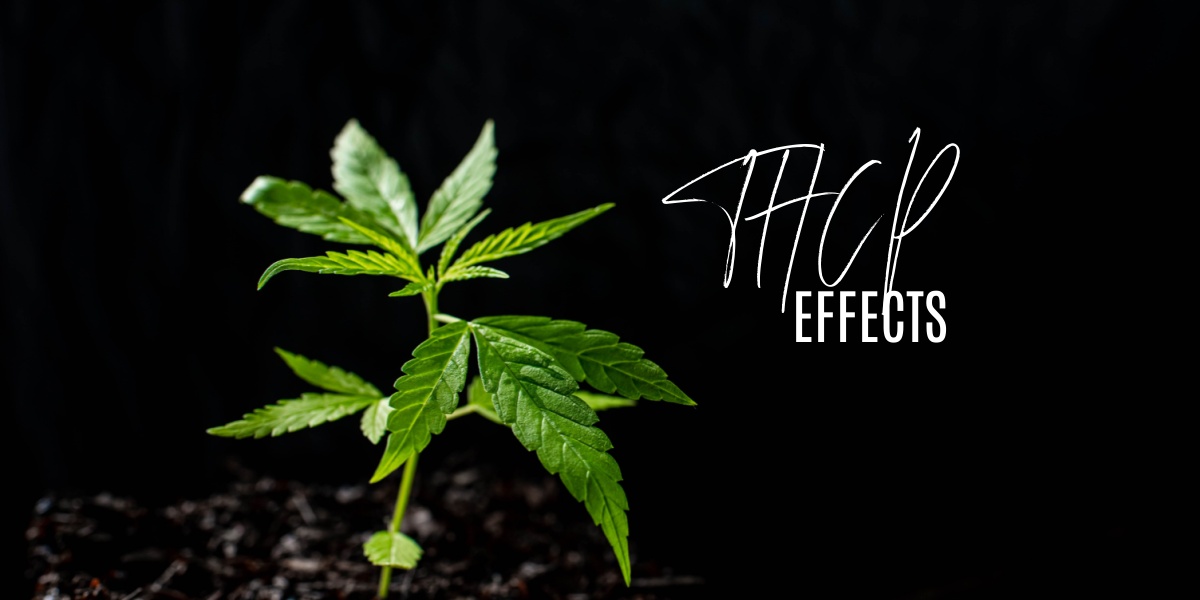Tetrahydrocannabiphorol (THCP) is a recently discovered cannabinoid similar to delta-9-tetrahydrocannabinol (delta-9 THC), cannabis’s main psychoactive compound. However, unlike THC’s five-carbon chain, THCP has a seven-carbon alkyl side chain, significantly increasing its potency. [1]
THCP, discovered in 2019 by Italian researchers, binds 33 times more strongly to CB1 receptors than THC, producing THC-like effects at significantly lower doses. [1] As with any novel compound, research on THCP is still evolving, but the initial findings highlight intriguing possibilities for medical applications, alongside a need for caution regarding adverse effects and the risk of misuse.
In this article, we explore the psychoactive profile of THCP, its potential therapeutic applications, safety considerations, and addiction risks. Utilizing the latest research and documented and anecdotal evidence, we will provide a balanced look at this powerful, understudied cannabinoid.
- THCP binds more strongly to cannabinoid receptors than THC, producing intensified psychoactive and physiological effects.
- THCP most likely shares THC’s medicinal properties (e.g., pain relief and appetite stimulation), but its therapeutic benefits remain unproven.
- Enhanced potency may heighten the risk of adverse effects and addiction, establishing the importance of further research and responsible use.

Psychoactive effects of THCP
People who use THCP report that THCP’s effects – euphoria, relaxation, altered sensory perception – are similar to a THC high but often more intense and sometimes longer-lasting.
Some anecdotal reports suggest that THCP’s effects can last significantly longer than those of a typical THC high. Given this potency, even people who use cannabis regularly have found THCP’s effects surprisingly strong, making it pivotal to explore its therapeutic potential carefully.
THC and THCP affect the endocannabinoid system (ECS)—a network of receptors regulating essential functions like pain, mood, appetite, and immune responses. By binding to CB1 receptors in the brain, THCP triggers the release of neurotransmitters that alter signaling pathways. This results in psychoactive and physiological changes. [1]
Beyond CB1 receptors, THCP may also interact with CB2 receptors, which are more abundant in peripheral tissues and immune cells.[2] While less studied, this interaction hints at potential anti-inflammatory or immunomodulatory effects, but more research is needed to fully understand THCP’s action on these receptors.
THCP's potential therapeutic benefits
With formal research on THCP’s therapeutic applications in its infancy, from preliminary findings and parallels with THC, we can infer a wide range of potential benefits. Below are some areas where THCP might show promise:
- Pain management: Cannabinoids are known for analgesic properties. Theoretically, higher receptor affinity could translate into more substantial pain relief. However, robust animal or clinical studies have yet to confirm THCP’s effectiveness for acute or chronic pain relief. Early laboratory tests indicate general cannabinoid-like effects, but these are preliminary.[1]
- Sleep aid and relaxation: High-potency cannabinoids have historically been used to promote relaxation and improve sleep quality. [3] Anecdotal user experiences point to THCP’s strong sedative potential at higher doses, making it a possible candidate for treating insomnia or sleep disturbances.
- Anxiety and stress relief: Some people report reduced anxiety when consuming THC or other cannabinoids. This typically occurs with controlled doses.[4] THCP’s potency means it may help in lower doses, but there is also a risk of heightened paranoia or anxiety with excessive intake. Establishing an optimal dosage range will be critical in harnessing THCP’s therapeutic potential without exacerbating stress or anxiety.
- Stimulate appetite and reduce nausea: Effects for which THC is used medically. Its heightened potency means a smaller dose might achieve the desired effect.
However, no clinical studies have evaluated THCP for any medical condition yet. Any therapeutic benefits of THCP remain theoretical at this stage, and it is not known to be more effective than standard THC.
Safety and side effects
THCP appears to cause the same side effects as THC, only intensified by its higher potency. Common cannabis-related effects that can all theoretically occur with THCP include: [5]
- Anxiety
- Paranoia
- Elevated heart rate
- Impaired coordination
- Cognitive impairment
- Dry mouth
Severe reactions have occurred, including a case where an individual experienced a 48-hour psychotic episode (hallucinations and delusions) and attempted self-harm after taking 8 mg of THCP. [6]
Addiction potential and risks
THCP is expected to have a similar addiction risk profile as high-THC cannabis. Chronic heavy use of THCP could lead to cannabis use disorder, with tolerance (needing more to feel the same effect) and withdrawal symptoms when quitting. About one-third of regular cannabis users develop some level of dependence. [7]
While research is not yet detailed, there is some evidence that potent cannabinoids can lead to cannabis use disorder. [7] Therefore, an ultra-potent cannabinoid like THCP might increase that likelihood. There is no evidence that THCP is inherently more addictive than THC, but its intense effects could encourage more frequent use. Moderation is advisable to avoid developing a dependency.
THCP overdose
An “overdose” with cannabis-related products typically refers to severe acute effects rather than life-threatening situations seen with opioids or other substances. However, high-potency cannabinoids like THCP can still cause troubling symptoms if taken in excessive amounts, such as: [6]
- Severe anxiety
- Paranoia
- Psychosis
- Rapid heart rate
- Intense dizziness or disorientation
- In extreme cases, fainting or panic attacks
Lethal overdose from cannabinoids is rare; these distressing adverse effects can be frightening and, in some instances, may necessitate medical attention.
Treatment for THCP and marijuana addiction
Treatment for THCP addiction is the same as for cannabis use disorder in general. There are no approved medications for cannabis dependence, so the focus is on behavioral therapy and support. Treatment options may include: [8]
- Cognitive Behavioral Therapy (CBT) helps people identify triggers, develop healthier coping strategies, and maintain abstinence and/or controlled use.
- Motivational interviewing encourages people who have a cannabis use disorder to explore their motivations for change, build self-efficacy, and set achievable goals.
- Support groups like Marijuana Anonymous offer peer-based support and accountability, which can be valuable for people struggling with cannabis or THCP use disorders.
Harm reduction strategies
Not everyone who uses cannabinoids wants to quit or needs complete abstinence. For people interested in decreasing their use or reducing risks, harm-reduction tactics like tracking dosage, limiting frequency of use, and selecting lower-potency products can help.


-guide-detail.jpg?v=1722502608)
-guide-detail.jpg?v=1741692490)
-guide-detail.jpg?v=1756808779)